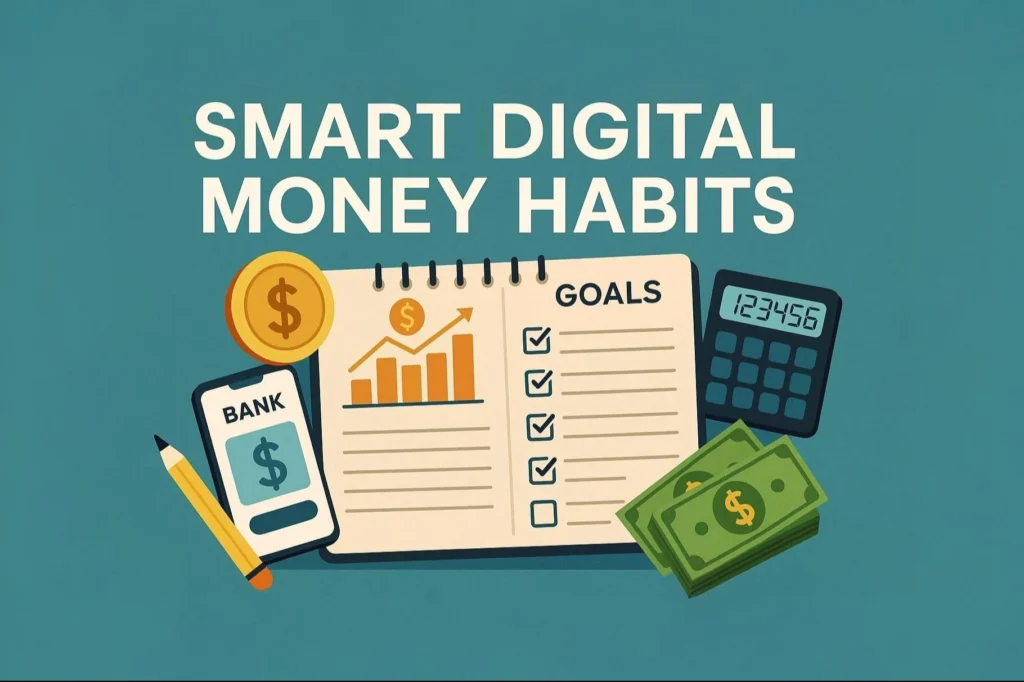Digital Money Habits 2025: Master Your Finances in the Modern World
In 2025, digital money habits are no longer optional — they’re essential. From managing subscriptions and using AI tools to automating savings and leveraging online platforms, the way we handle money has changed dramatically. Whether you’re a remote worker, freelancer, or someone simply looking to save smarter, this guide will walk you through the best practices to improve your digital financial behavior in the modern era.
Table of Contents
- 1. Open a High-Yield Digital Bank Account
- 2. Use AI to Track and Categorize Spending
- 3. Automate Your Micro-Savings
- 4. Earn Cash Back Effortlessly
- 5. Audit Your Subscriptions
- 6. Use Free AI Tools Instead of Paid Ones
- 7. Invest in Budget-Friendly Skill Platforms
- 8. Schedule Weekly Financial Reviews
- 9. Embrace Digital Budgeting Apps
- 10. Build Passive Income Streams Online
- 11. Shop Smarter with Price Trackers
- 12. Leverage Hidden Features in Common Apps
- 13. Use Reward-Based Payment Methods
- 14. Protect Your Digital Financial Data
- 15. Join Financial Newsletters That Actually Help
- Final Thoughts
1. Open a High-Yield Digital Bank Account
The first step toward mastering digital money habits in 2025 is choosing where your money lives. Traditional banks may still have their place, but digital banks like Chime, SoFi, and Revolut offer high-yield savings accounts, near-instant transfers, and intuitive mobile interfaces. These platforms often come with tools that round up spare change for savings and give you detailed spending insights.
By moving your emergency fund and savings to a high-yield digital bank, you earn more while maintaining access and control through your smartphone. Plus, most of these accounts are FDIC-insured or equivalent depending on your country.
Tip: Many digital banks let you set up “vaults” or “spaces” for specific goals like taxes, vacation, or investing — a powerful feature to visually track where your money goes.
2. Use AI to Track and Categorize Spending
Apps like NerdWallet, You Need a Budget (YNAB), and Plum use artificial intelligence to analyze your spending and send alerts, detect subscriptions, and suggest budget improvements. These tools help you stay accountable in real-time and make smarter decisions without having to manually review transactions every week.
Want to dive deeper? Some of these apps integrate directly with your bank account and use machine learning to identify unusual expenses, categorize transactions, and help you visualize how your income flows each month.
Pairing AI spending tools with a freelancer mindset? Then check out our guide on getting paid faster as a freelancer.
3. Automate Your Micro-Savings
One of the smartest digital money habits to build is automation. Platforms like Acorns, Qapital, or even banking apps like Revolut allow you to round up each transaction and automatically invest or save the difference.
This strategy works in the background — no effort required. For example, if you spend $3.25, the app rounds it up to $4 and invests $0.75. Over time, these small amounts can snowball into hundreds or thousands in savings.
Even better, some apps allow you to set “rules” — like saving $5 every time you skip a delivery meal or work out at home.
4. Earn Cash Back Effortlessly
Cashback is no longer limited to credit cards. Use browser extensions like Rakuten or Honey to get automatic discounts and earn cashback at thousands of stores. Combine this with reward cards like the Chase Freedom Flex or Capital One Savor for stacking benefits.
Want to simplify it even more? Some fintech apps connect to your debit or credit card and deposit cashback automatically.
This isn’t just saving — it’s passive earning.
Also, check out our post on hidden money-making features inside apps for more ways to stack rewards daily.
5. Audit Your Subscriptions
It’s shockingly easy to sign up for a trial and forget about it. Subscription creep can silently drain your bank account. Use tools like Rocket Money (formerly Truebill) or Bobby to monitor and cancel subscriptions you’re no longer using.
In 2025, this is one of the most crucial digital money habits — especially if you’re using multiple SaaS tools for work or entertainment. A simple $15/month subscription canceled today could add up to $180 saved yearly. Multiply that across several tools, and you’re looking at real savings.
Keep your must-haves, and ditch the rest.
6. Use Free AI Tools Instead of Paid Ones
Many freelancers and remote workers pay for tools that have excellent free alternatives. For example:
For more, check out our full post: Free AI Tools for Freelancers in 2025.
Why pay when you can get 80% of the features — for free?
7. Invest in Budget-Friendly Skill Platforms
Upgrading your skills doesn’t need to be expensive. Instead of paying hundreds for online courses, use platforms like Skillshare, Udemy, or Coursera that regularly offer discounted or free content in areas like coding, design, business, and freelancing.
Set a budget—say $10/month—for ongoing education. Over time, this pays off in higher income opportunities and smarter decision-making. It’s one of the few investments that keeps giving.
8. Schedule Weekly Financial Reviews
Just like you plan your week, you should plan your money. Take 20 minutes every weekend to look at your spending, earnings, savings, and upcoming expenses. Use Notion, Google Sheets, or a dedicated budgeting app.
This habit helps you catch unnecessary charges, adjust budgets, and forecast how well you’re sticking to your financial goals. Want to go further? Use templates like the ones we recommend in Scale Your Freelance Business in 2025.
9. Embrace Digital Budgeting Apps
Classic spreadsheets still work, but modern digital budgeting tools like Mint, Goodbudget, and YNAB take budgeting to the next level.
These apps sync with your accounts, provide dashboards, and let you categorize everything in real-time. For remote workers or solopreneurs juggling variable income, budgeting becomes clearer and more visual.
10. Build Passive Income Streams Online
Digital money habits aren’t just about saving—they’re about earning smarter. Build passive income through:
- Affiliate marketing on your blog or social media
- Selling digital products on Gumroad or Ko-fi
- Launching an AI-powered YouTube channel (see: Start an AI-Powered Online Business)
These systems take time but build compounding returns. Choose one stream, stay consistent, and automate where possible.
11. Shop Smarter with Price Trackers
Tools like CamelCamelCamel (for Amazon) or Keepa track item prices over time. If you’re eyeing new tech, software, or personal items, set alerts so you only buy when prices drop.
Impulse buying is the enemy of smart digital money habits. Alerts make shopping more intentional and save real money over time.
12. Leverage Hidden Features in Common Apps
You might already use apps like PayPal, Venmo, or even Canva—but not their full money-saving potential. Many apps hide valuable tools, like budgeting insights, free transfer options, or creator monetization tools.
Check out our breakdown of hidden money-making features in apps you already use.
13. Use Reward-Based Payment Methods
Always use a payment method that gives back—whether it’s cashback cards, points systems, or crypto rewards. Compare platforms using sites like NerdWallet or CardRatings.
Every purchase is an opportunity. Why pay full price with nothing in return?
14. Protect Your Digital Financial Data
Good digital money habits also include security. Use:
- Password managers like LastPass or Bitwarden
- Two-factor authentication (2FA)
- VPNs when accessing financial data on public Wi-Fi
Digital theft is real. Treat your accounts like a vault.
15. Join Financial Newsletters That Actually Help
Don’t rely only on social media for financial advice. Subscribe to newsletters that provide tested, practical money tips. Examples:
- Morning Brew
- Finimize
- And of course, our own Earn With Tools newsletter
You’ll get smarter every week—without spending a cent.
Final Thoughts
Mastering digital money habits in 2025 means more than budgeting. It means using AI, automation, and smarter decision-making to stretch your income, reduce friction, and increase peace of mind.
Start with just one habit from this list. Whether it’s automating savings, tracking subscriptions, or learning to monetize your time online — take action today.
Need more? Check out our newest post on AI Tools for Digital Creators in 2025.
And don’t forget — join our newsletter for weekly strategies on AI, remote income, and productivity hacks.




